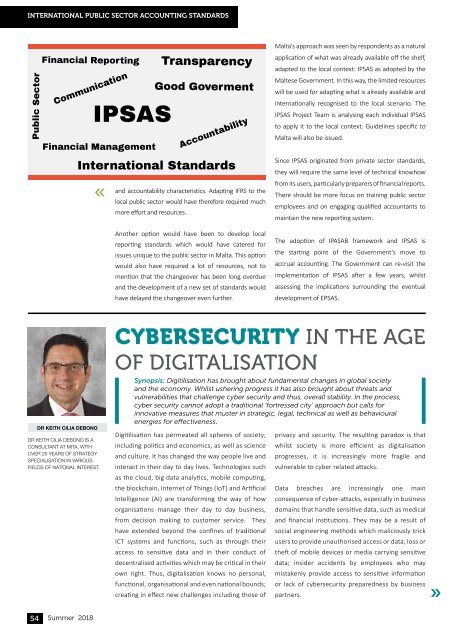ACCOUNTANT_SUMMER18_AMENDED_PG12
Create successful ePaper yourself
Turn your PDF publications into a flip-book with our unique Google optimized e-Paper software.
INTERNATIONAL PUBLIC SECTOR ACCOUNTING STANDARDS<br />
Public Sector<br />
Financial Reporting Transparency<br />
Communication<br />
IPSAS<br />
Financial Management<br />
Good Goverment<br />
Accountability<br />
International Standards<br />
and accountability characteristics. Adapting IFRS to the<br />
local public sector would have therefore required much<br />
more effort and resources.<br />
Another option would have been to develop local<br />
reporting standards which would have catered for<br />
issues unique to the public sector in Malta. This option<br />
would also have required a lot of resources, not to<br />
mention that the changeover has been long overdue<br />
and the development of a new set of standards would<br />
have delayed the changeover even further.<br />
Malta’s approach was seen by respondents as a natural<br />
application of what was already available off the shelf,<br />
adapted to the local context: IPSAS as adopted by the<br />
Maltese Government. In this way, the limited resources<br />
will be used for adapting what is already available and<br />
internationally recognised to the local scenario. The<br />
IPSAS Project Team is analysing each individual IPSAS<br />
to apply it to the local context. Guidelines specific to<br />
Malta will also be issued.<br />
Since IPSAS originated from private sector standards,<br />
they will require the same level of technical knowhow<br />
from its users, particularly preparers of financial reports.<br />
There should be more focus on training public sector<br />
employees and on engaging qualified accountants to<br />
maintain the new reporting system.<br />
The adoption of IPASAB framework and IPSAS is<br />
the starting point of the Government’s move to<br />
accrual accounting. The Government can re-visit the<br />
implementation of IPSAS after a few years, whilst<br />
assessing the implications surrounding the eventual<br />
development of EPSAS.<br />
DR KEITH CILIA DEBONO<br />
DR KEITH CILIA DEBONO IS A<br />
CONSULTANT AT MITA, WITH<br />
OVER 25 YEARS OF STRATEGY<br />
SPECIALISATION IN VARIOUS<br />
FIELDS OF NATIONAL INTEREST.<br />
CYBERSECURITY IN THE AGE<br />
OF DIGITALISATION<br />
Synopsis: Digitilisation has brought about fundamental changes in global society<br />
and the economy. Whilst ushering progress it has also brought about threats and<br />
vulnerabilities that challenge cyber security and thus, overall stability. In the process,<br />
cyber security cannot adopt a traditional ‘fortressed city’ approach but calls for<br />
innovative measures that muster in strategic, legal, technical as well as behavioural<br />
energies for effectiveness.<br />
Digitilisation has permeated all spheres of society;<br />
including politics and economics, as well as science<br />
and culture. It has changed the way people live and<br />
interact in their day to day lives. Technologies such<br />
as the cloud, big data analytics, mobile computing,<br />
the blockchain, Internet of Things (IoT) and Artificial<br />
Intelligence (AI) are transforming the way of how<br />
organisations manage their day to day business,<br />
from decision making to customer service. They<br />
have extended beyond the confines of traditional<br />
ICT systems and functions, such as through their<br />
access to sensitive data and in their conduct of<br />
decentralised activities which may be critical in their<br />
own right. Thus, digitalisation knows no personal,<br />
functional, organisational and even national bounds;<br />
creating in effect new challenges including those of<br />
privacy and security. The resulting paradox is that<br />
whilst society is more efficient as digitalisation<br />
progresses, it is increasingly more fragile and<br />
vulnerable to cyber related attacks.<br />
Data breaches are increasingly one main<br />
consequence of cyber-attacks, especially in business<br />
domains that handle sensitive data, such as medical<br />
and financial institutions. They may be a result of<br />
social engineering methods which maliciously trick<br />
users to provide unauthorised access or data; loss or<br />
theft of mobile devices or media carrying sensitive<br />
data; insider accidents by employees who may<br />
mistakenly provide access to sensitive information<br />
or lack of cybersecurity preparedness by business<br />
partners.<br />
54 Summer 2018

















